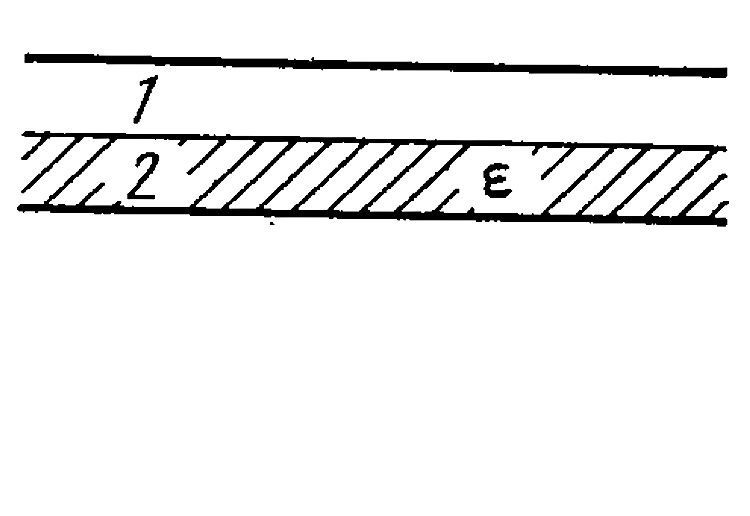A capacitor filled with dielectric of permittivity ε=2.1 losses half the charge acquired during a time interval τ=3.0min. Assuming the charge to leak only thorugh the dielectric filler, calculate its resistivity.
The correct Answer is:p=τε0εln2=1.4×1013Ωm
Step by step video, text & image solution for A capacitor filled with dielectric of permittivity epsilon = 2.1 losses half the charge acquired during a time interval tau = 3.0 min. Assuming the charge to leak only thorugh the dielectric filler, calculate its resistivity. by Physics experts to help you in doubts & scoring excellent marks in Class 12 exams.
Updated on:21/07/2023Topper's Solved these Questions
Similar Questions
A point charge q=3.0m,uC is located at the centre of a spherical layer of uniform isotropic dielectric with permittivity ε=3.0. The inside radius of the layer is equal to a=250mm, the outside radius is b=500mm. Find the electrostatic energy inside the dielectric layer.
View SolutionHalf the space between two concentricv elecrodes of a sphereical capacitor is filled , as shwon in Fig, with unifrom istropic dielectric with permittively ε. The charge of the capacitor is q. Find the magnitude of the electric field strength between teh electrodes as a function of distance r from the curvature centre of teh electrodes.

View SolutionA parallel-plate capacitor is filled with a delectric meterial having resistivity(ρ)and dielectric constant K.The capcitor is charged and disconnected from the charging source. The capacitor is slowly discharged through the dielectric.Show that the time constant of the discharge is independent of all gepmetrical parameters like the plate area or separation between the plates. Find this time constant.
View SolutionA parallel-plate capacitor is filled half-and half with two dielectrics of dielectric constants ε1 and ε2, respectively. In the first case, one dielectric is placed over the other. In the second case, one dielectric fills half the space and the other the second half. Calculate their capacitances in the two cases. The distance between the plates is d and area of each plate is A.

[Hint:(i) In fact there are two capacitors, each of area equal to the area of a plate and thickness equal to half the plate separation. The are in series. (ii) There are two capacitors, each of thickness equal to the plate separation and area equal to half of the area of a plate. They in parallel.]
View SolutionTwo parallel plate air capacitance C, were connected in series to a battery with emf ξ. Then one of the capacitors was filled up with uniform dielectric with permittivity ε. How many times did the electric field strength in that capacitor decrease ? What amount of charge flows throgh the battery ?
View SolutionA parallel palte capacitor is filled by a dielectric whose relative permittively varies with the applied voltage (U) as ε=αU where alpha =2V−1. A similar capacitor with no dielectric is charged to U0=78V. It is then is connected to the uncharged capacitor with the dielectric. Find the final voltage on the capacitors.
View SolutionInitially the space between the plates of the capacitor is filled with air, and the field strength in the gap is equal to E0. Then half the gap is filled with uniform isotropic dielectric with permittivity ε as shown in Fig. Find the moduli of the introduction of the dielectric
(a) deos not change the voltage across the plates,
(b) leaves the charges at the plates constant.

View SolutionA parallel-plate air capacitor of plate separation 2mm and capacitance 1μF is charged to 100V. A dielectric slab of relative permittivity 50 is now inserted so as to fill the space between the plates. (i)Find the polarisation charge on one of the boundaries of the dielectric slab. (ii) Find the magnitude of the polarisation of the dielectric slab. (ε0=8.85×10−12C2/N.m2)
View SolutionThe gap between the plates of a prallel-plate capacitor is filled up with two dielectric layers 1 and 2 thickness d1 and d2 permittivities ε1 and ε2 and resistivities ρ1 and ρ2. A dc voltage V is applied to the capacitor with electric field directed from layer 1 to layer 2 find σ the surface density of extraneous charges at the boundary between the dielectric layers and the condition under with σ=0.
View SolutionA parallel- plate capacitor, fileld with a dielectric of dielectric consatnt k, is charged to a potential V0. It is now disconnected from the cell and the slab is removed. If it now discharges, with time constant τ, through a resistance then find time after which the potential difference across it will be V0 ?
View Solution
